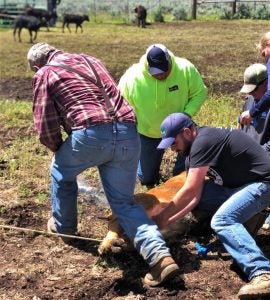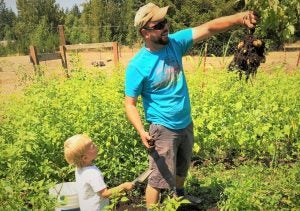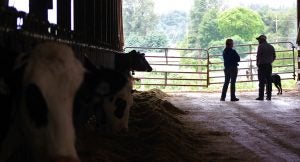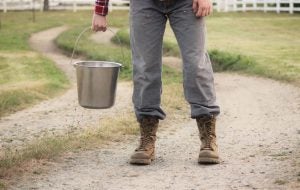“Cultivators of the earth are the most vigorous, the most independent, the most virtuous, and they are tied to their country and its liberty by the most lasting bands.” — Thomas Jefferson.
Whether it’s Fourth of July, Veterans Day, or just another day where we live and breathe free, it is noteworthy to reflect on the industry that helped to build this nation and how it continues to support the success of our servicemembers today. As has been the case in major wars throughout U.S. history, many veterans and active-duty military still come from farming communities. Rural America grows young men and women who step up to serve, but there is a struggle for them to find agricultural work upon returning home.
In 2004, more than 44 percent of military recruits came from rural areas, and the farming industry is continually looking to give veterans job opportunities that can support them when they return to their rural roots.
The farming community built this nation. From the very start, agriculture has fueled the economy and fed a growing population. As the 20th century began, agriculture progressed with the first successful U.S. made tractor, and slowly farming with horsepower began to fade. The American tractor grew in popularity in the ’30s and more so as the economy boomed despite wartime rationing during World War II. On the homefront, farming continued but with less workforce as thousands of farm boys lined the streets to support the war effort.

Today, programs across the nation are providing an increasing amount of support for veterans, helping in areas such as mental wellness and finding the jobs and careers they want. Still, a sometimes-overlooked avenue is farming and the power of healing that comes with it. Over the last several decades programs connecting veterans to the land are seeing more and more potential.
This potential is something Jason Alves of the Washington State Department of Veteran Affairs is passionate about. He has witnessed firsthand the results of these programs, and for the past several years has dedicated his work to exploring and developing these ideas further. Alves was born in the southeastern corner of Oregon, where he grew up on his family’s ranch raising alfalfa and working on a cow/calf operation of 350 to 500 head of cattle before joining the Navy in 2001.
“I jumped at the chance to serve my country and look at potentially going into higher education and going to college,” Alves remembers.
During his four years in the Navy he served on the USS Kittyhawk, spending three years overseas in Japan.
Upon returning home, Alves’ passion for giving back and helping veterans ultimately led him to the state department, where he works as program manager of the Veterans Conservation Corps and the Vet Corps program — specifically focusing on counseling and wellness.
These programs connect veterans with nature and the state’s natural resources, with the goal of transitioning often into employment. Opportunities for veterans in these programs center around peer-mentoring, which gives veterans the chance to serve again by teaching and learning together.
The Veterans Conservation Corps began as an avenue to get outside and work primarily with salmon and stream restoration, but Alves said that as the programs continued, more and more calls came in from veterans asking how they could become involved in agriculture.
“Overall, there is a community movement in the Pacific Northwest to connect with food and where food comes from,” Alves said. “I think veterans are also caught up in that. But the bigger reason we turn to ag is due to the high rural veteran unemployment rate in our state.”

Most of the program initiatives for veterans in Washington state are located along one main stretch of the interstate highway. These opportunities focus primarily on corporate and office careers, but Alves says many veterans aren’t looking to sit in an office and want something potentially more rewarding.
“They are kind of left on their own to figure something out,” he said. “We have about 113,000 veterans who live in rural parts of the [Washington] state and office work is not something that interests them or is feasible due to location.”
That’s where the state department comes in and the Veterans Conservation Corps sees a new avenue: farming. This is a place to start for many veterans exploring options in agriculture.
“In 2015 we started the Veterans Farm at Orting, Washington, in the Puyallup Valley,” Alves said. “We have about 45 acres where smaller plots are available for veterans looking to explore farming as a part of their future.”
This program provides a starting point for the beginner to learn the basics of growing.
“We built off of what we learned in habitat restoration programs and realized that internship programs were the best option for those interested in farming,” Alves said.
The state’s Veteran Affairs department provides a stipend, and the veteran can try on an industry for a set amount of time.
“We found this was a way to place veterans, who have a high unemployment rate from rural areas, directly into ag, which has a high need for labor force,” he said.
What industries have he seen success in?
Over the last several years, Alves has explored the dairy industry as a candidate for placing veteran interns. Veterans have also made inroads on dairy farms primarily in the eastern portion of the United States through the Farmer Veteran Coalition.

Alves has met with several dairy farmers over the past two summers and is currently working on setting up the program with the hopes of successfully placing a veteran on a dairy in the coming months.
The future remains unknown, but possibilities are endless. Alves smiles at what has been done over the past decade to help veterans but always looks for ways to improve, change and grow along the way. Across the nation, support for veterans in ag is a rising beacon. Resources, networking opportunities, financial support through USDA, local grants and other partnerships help veterans to be successful in farming and continuing their service to the country through agriculture. The transition from military to agriculture can be a smooth one, and service members wanting to return to their roots and work on the land which can provide a way of healing after combat is surely a noble cause.

The next time we find ourselves enjoying a delicious meal, remember the saying: If you ate today thank a farmer, if you ate in peace thank a soldier. And just maybe the two go hand in hand.
Aleah Bright is a hobby farmer who was born and raised in Washington state and grew up showing Jersey cattle in 4-H. Aleah is enthusiastic about sharing her passion for agriculture and inspiring the future generations of American farmers.



